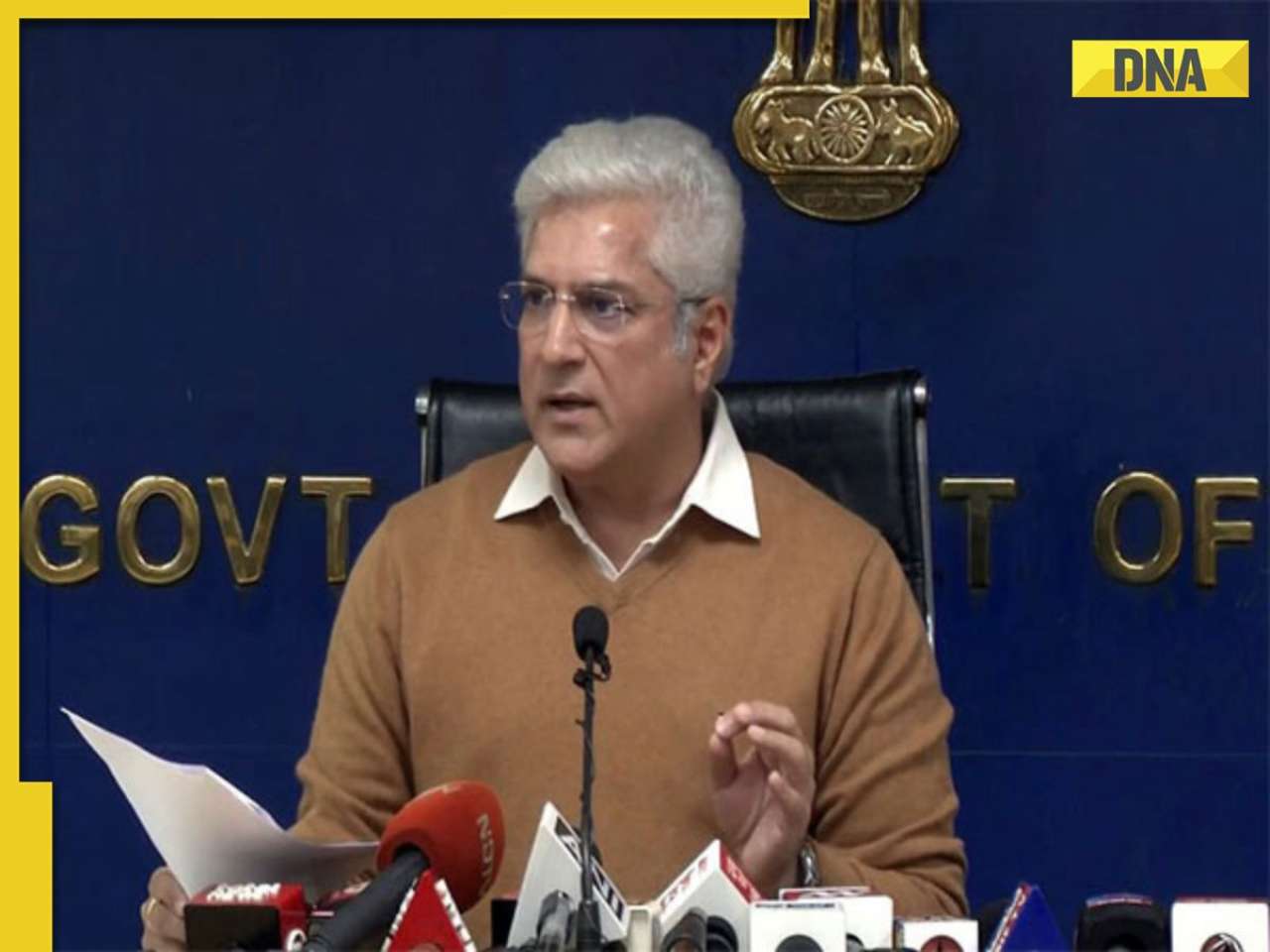BETTER HALF: A higher loan amount, lower interest are some advantages of taking a joint loan
While buying a home and applying for a home loan it is always beneficial to add one's spouse as a co-owner and co-applicant. The fact that it helps in getting a higher loan amount is well known. But there are some other benefits that are not well known. Let use see what these are.
Eligibility and interest rate
When applying for a home loan, the lender calculates the loan eligibility amount based on the applicants' income. If both partners are salaried employees and jointly apply for the loan, they can apply for a higher loan amount as their eligibility increases with the higher income. Thus they can opt for a property of higher value or reduce their own contribution.
For example, an applicant earnings 10 lakh annual salary is eligible for loan of Rs 50 lakh, as one can avail a loan amount of up to five times net salary. However, if the applicant's wife is also working and earns a similar amount, then the combined income becomes Rs 20 lakh. This pegs the combined loan eligibility amount at Rs 1 crore.
Moreover, if the first applicant has lower employment vintage or a poor credit score, making the spouse (assuming the spouse has better credentials) as the co-owner of the house, would strengthen their case. It may also happen that the lender might even sanction the loan depending on the income and the credit score of the wife, if the husband's loan application is not worthy to be processed and sanctioned.
Also, many banks offer a subsidy in the range of 50–100 basis points on the home loan rate if the first owner is the woman. This will reduce the monthly Equated Monthly Installment (EMI) and overall financial burden.
Reduction in stamp duty
Many states in India have female-friendly policies when it comes to property ownership listing the wife as the first owner. A property solely owned by a man member attracts a higher registration cost as against one owned by a woman. Hence, adding a spouse as a co-owner will help save on stamp duty charges and registration fees.
For example: A woman who applies for property ownership in Delhi has to pay 4% of the property's market value as its stamp duty, while a man has to pay 6%. Similarly, in Rajasthan the stamp duty for a woman is 4% of the property'a market value, while for a man it is 5%.
In rural Haryana, a woman property owner has to shell out 4% as stamp duty, while a man has to pay 6%. While in the urban area woman has to pay 6% as stamp duty, as compared to her male counterpart, who has to pay 8%.
Tax benefit
Property jointly owned by a married couple (if both are salaried) would enable each one of them to claim a maximum amount of Rs 1.5 lakh for principal repayment as income tax (IT) deductions under Section 80 (C). The individual income and the share in the property of each owner will decide the tax benefit that each is entitled to. Each of the joint owners can also claim Rs 2 lakh as interest payment under Section 24(B) of the IT Act. Tax benefits enable both owners to save a substantial amount of their income under this head. However, the total deduction sought under the IT cap should not exceed the actual payment of principal and interest on the loan amount.
Also, if the property that has a joint ownership is given on rent, then the tax levied on the rental income being generated also gets divided between the two partners. Hence, the tax burden gets distributed between the joint owners.
Succession
Lastly, when a property has a joint ownership of both husband and wife, its succession plan becomes a smooth process in the case of any eventuality of either partner. When the immovable asset is registered in the names of both partners, succession rules and regulations specify that this asset would go to the living partner after the demise of either of the joint partners. This saves a lot of legal hassles that might lead to lengthy paper works, with room for ambiguity in the succession plan.
The writer is CEO & ED, Essel Finance Home Loans
![submenu-img]() Verantes Living Awarded as India’s No.1 Stainless Steel Modular Kitchen Brand
Verantes Living Awarded as India’s No.1 Stainless Steel Modular Kitchen Brand![submenu-img]() Narayana Murthy’s Infosys set to invest Rs 170000000 in this startup
Narayana Murthy’s Infosys set to invest Rs 170000000 in this startup![submenu-img]() 'Towards reducing pollution..': Delhi govt approves replacement, induction of electric vehicles in 'Gramin Sewa'
'Towards reducing pollution..': Delhi govt approves replacement, induction of electric vehicles in 'Gramin Sewa'![submenu-img]() Discover Stainless France, the Leading Supplier of Cobalt Chrome
Discover Stainless France, the Leading Supplier of Cobalt Chrome![submenu-img]() Kritika Kamra says men should take responsibility for fighting sexism: 'There's a thin line between...'
Kritika Kamra says men should take responsibility for fighting sexism: 'There's a thin line between...'![submenu-img]() मोदी सरकार ने तय कर दी नक्सलवाद को खत्म करने की अंतिम तारीख, शाह की माओवादियों से सरेंडर करने की अपील
मोदी सरकार ने तय कर दी नक्सलवाद को खत्म करने की अंतिम तारीख, शाह की माओवादियों से सरेंडर करने की अपील![submenu-img]() Maharashtra: महायुति और MVA के बाद राज्य में बना तीसरा गठबंधन, साथ आईं ये पार्टियां
Maharashtra: महायुति और MVA के बाद राज्य में बना तीसरा गठबंधन, साथ आईं ये पार्टियां![submenu-img]() उत्तर प्रदेश म�ें एक और एनकाउंटर, मंगेश यादव के बाद अजय यादव को UP पुलिस ने मारी गोली
उत्तर प्रदेश म�ें एक और एनकाउंटर, मंगेश यादव के बाद अजय यादव को UP पुलिस ने मारी गोली![submenu-img]() RITES shares: रेलवे PSU के शेयर में आज 48% की गिरावट क्यों देखी जा रही है, समझें पूरा मामला
RITES shares: रेलवे PSU के शेयर में आज 48% की गिरावट क्यों देखी जा रही है, समझें पूरा मामला![submenu-img]() कनाडा में पढ़ना हुआ मुश्किल, 35% स्टूडेंट वीजा में कटौती, भारतीय छात्रों पर कैसा रहेगा इसका असर?
कनाडा में पढ़ना हुआ मुश्किल, 35% स्टूडेंट वीजा में कटौती, भारतीय छात्रों पर कैसा रहेगा इसका असर? ![submenu-img]() Ford to return to India after 2 years with reopening of....
Ford to return to India after 2 years with reopening of....![submenu-img]() Maruti Suzuki launches new Swift CNG, check price, mileage, other features
Maruti Suzuki launches new Swift CNG, check price, mileage, other features![submenu-img]() ‘30 LPA, 3BHK, no in-laws’: Woman earning Rs 1.32 lakh salary lists demands for future husband, netizens say...
‘30 LPA, 3BHK, no in-laws’: Woman earning Rs 1.32 lakh salary lists demands for future husband, netizens say...![submenu-img]() In a big EV push, Centre launches Rs 10900 crore PM E-Drive scheme to replace…
In a big EV push, Centre launches Rs 10900 crore PM E-Drive scheme to replace…![submenu-img]() World’s longest car has helipad, swimming pool, mini-golf course, can seat over…; it cost…
World’s longest car has helipad, swimming pool, mini-golf course, can seat over…; it cost…![submenu-img]() Meet IPS officer who has resigned after serving for 18 yrs due to...
Meet IPS officer who has resigned after serving for 18 yrs due to...![submenu-img]() Meet Indian man, who got hired whopping Rs 12000000 crore salary job, not from IIT, IIM he is...
Meet Indian man, who got hired whopping Rs 12000000 crore salary job, not from IIT, IIM he is...![submenu-img]() Meet woman who left medical career for UPSC exam , became IPS with AIR 165 then left job due to...
Meet woman who left medical career for UPSC exam , became IPS with AIR 165 then left job due to...![submenu-img]() Meet man, who left NDA due to depression, then cracked UPSC exam to become IAS officer, his AIR was...
Meet man, who left NDA due to depression, then cracked UPSC exam to become IAS officer, his AIR was...![submenu-img]() Meet youngest CEO of India, who created first app at 9, began his own company at 13, now he is…
Meet youngest CEO of India, who created first app at 9, began his own company at 13, now he is…![submenu-img]() Congress President Kharge Slams & Opposes 'One Nation, One Election' Proposal, Calls It Impractical
Congress President Kharge Slams & Opposes 'One Nation, One Election' Proposal, Calls It Impractical![submenu-img]() Why 'One Nation One Election' Is important? Ashwini Vaishnaw Explains After It Gets Cabinet Approval
Why 'One Nation One Election' Is important? Ashwini Vaishnaw Explains After It Gets Cabinet Approval![submenu-img]() Jammu Kashmir Assembly Election 2024 Phase 1 Highlights: What Happened In First phase In J&K Polls?
Jammu Kashmir Assembly Election 2024 Phase 1 Highlights: What Happened In First phase In J&K Polls?![submenu-img]() One Nation One Election: Centre Clears Proposal, Bill To Be Introduced In Winter Session | Modi 3.0
One Nation One Election: Centre Clears Proposal, Bill To Be Introduced In Winter Session | Modi 3.0![submenu-img]() Haryana Elections 2024: Is BJP Set To Lose In Haryana? Anti-Incumbency And Other Factors Analysed
Haryana Elections 2024: Is BJP Set To Lose In Haryana? Anti-Incumbency And Other Factors Analysed![submenu-img]() Verantes Living Awarded as India’s No.1 Stainless Steel Modular Kitchen Brand
Verantes Living Awarded as India’s No.1 Stainless Steel Modular Kitchen Brand![submenu-img]() Narayana Murthy’s Infosys set to invest Rs 170000000 in this startup
Narayana Murthy’s Infosys set to invest Rs 170000000 in this startup![submenu-img]() Discover Stainless France, the Leading Supplier of Cobalt Chrome
Discover Stainless France, the Leading Supplier of Cobalt Chrome![submenu-img]() ITR filing: Haven’t received your income tax refund yet? Here’s what you should do
ITR filing: Haven’t received your income tax refund yet? Here’s what you should do![submenu-img]() Meet ‘delivery boy’ who beats Mukesh Ambani in world’s billionaire list, his net worth is…
Meet ‘delivery boy’ who beats Mukesh Ambani in world’s billionaire list, his net worth is…![submenu-img]() In pics: Saiyami Kher conquers Ironman triathlon in Germany, swims, cycles, runs to complete endurance races
In pics: Saiyami Kher conquers Ironman triathlon in Germany, swims, cycles, runs to complete endurance races![submenu-img]() Meet IAS officer, who cracked in UPSC exam along with full-time job, her AIR was...
Meet IAS officer, who cracked in UPSC exam along with full-time job, her AIR was...![submenu-img]() In pics | India vs Bangladesh 1st Test, Day 1
In pics | India vs Bangladesh 1st Test, Day 1![submenu-img]() From Mechuka to Hayuliang village: Explore lesser-known destinations of Arunachal Pradesh
From Mechuka to Hayuliang village: Explore lesser-known destinations of Arunachal Pradesh![submenu-img]() From Simlipal National Park to Mahendragiri: Top 6 hidden gems to discover in Odisha
From Simlipal National Park to Mahendragiri: Top 6 hidden gems to discover in Odisha![submenu-img]() 'Towards reducing pollution..': Delhi govt approves replacement, induction of electric vehicles in 'Gramin Sewa'
'Towards reducing pollution..': Delhi govt approves replacement, induction of electric vehicles in 'Gramin Sewa'![submenu-img]() More trouble for ex-RG Kar principal Sandip Ghosh, Bengal medical body now...
More trouble for ex-RG Kar principal Sandip Ghosh, Bengal medical body now...![submenu-img]() Tirupati Laddu row: Lab report confirms prasada contains beef fat, fish oil
Tirupati Laddu row: Lab report confirms prasada contains beef fat, fish oil![submenu-img]() Delhi: Water supply to be shut down in capital for 12 hours tomorrow due to…; check list of affected areas
Delhi: Water supply to be shut down in capital for 12 hours tomorrow due to…; check list of affected areas![submenu-img]() FATF says India faces severe 'terrorist financing threats' from...
FATF says India faces severe 'terrorist financing threats' from...










































)
)
)
)
)
)
)
)
)
)
)
)
)
)
)





)
)
)
)
)
)